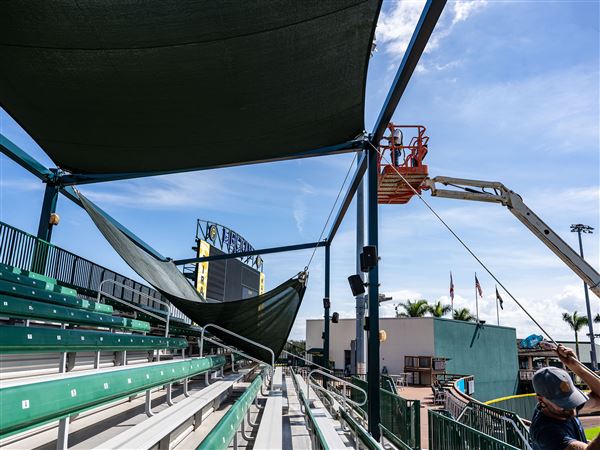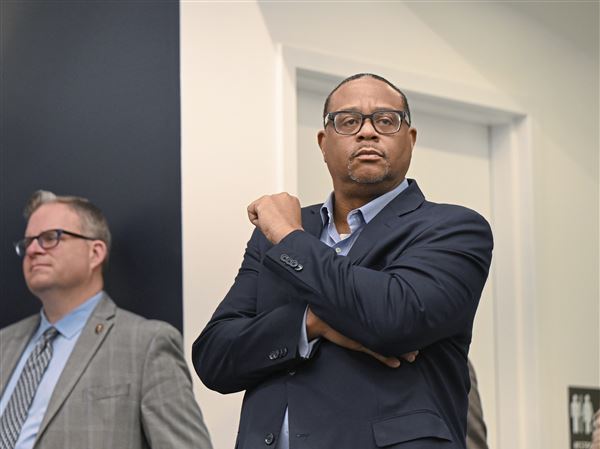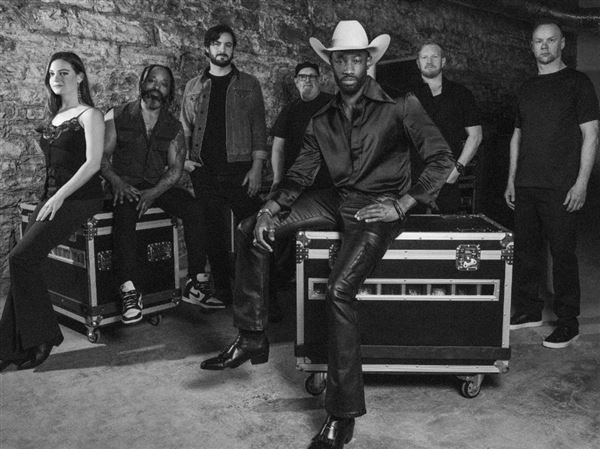
Jim Cramer
Click photo for larger image.
Jim Cramer, rested and recharged after a vacation in Costa Rica, is raring to get back on the radio airwaves.
"How can I not be talking about Google down 7 percent?" he says. "Come on, give me the mike!"
"Entertaining financial expert" would seem to be an oxymoron, until you've seen Mr. Cramer in action. His nightly "Mad Money" on CNBC is a hurricane-force hour of financial advice, commentary and analysis that mirrors the frantic pace of the markets he covers.
The manic host runs around the set, firing off sound effects, such as ringing cash registers and lowing cattle, to underscore the points he's making. "Booyah!" he yells in ritual greeting to callers. He throws chairs. If a caller rambles and slows the pace, Mr. Cramer will bring out a blanket and pillow and take a pretend nap.
But Mr. Cramer also has a radio program, "Jim Cramer's Real Money," which debuts tomorrow on KDKA-AM (1020), airing weekdays at 1 p.m.
The radio show, which launched in 2001, recently moved to CBS Radio -- KDKA's parent company -- from the WOR Radio Network. The show also will air on CBS stations in New York, Los Angeles, Chicago, Houston, Detroit, Baltimore and Portland, Ore., and will be syndicated to non-CBS stations through Westwood One.
TV's "Mad Money" and radio's "Real Money" are two very different products, their host says. "On TV, you have to default to performance, whereas radio is conversational. I always regard myself as a Soviet comic from 1972 on TV, whereas on radio I'm much more earnest and not cynical. [On radio], I explain what I know about the system that you don't, so that you can use it to your advantage in a positive, fulfilling and uplifting way.
"My TV show is like Vegas. And my radio show is a bar: It's me on a stool. I like them both. If they were the same thing, I'd drop one of them."
Mr. Cramer's path to media financial guru was not a direct one. He grew up in Wyndmoor, near Philadelphia, and went to Harvard University, where he was editor of the Harvard Crimson. After graduating, he worked as a reporter for the Tallahassee Democrat and the Los Angeles Herald Examiner.
He left journalism to go to Harvard Law School. But the world of Wall Street and investing captured his interest and, after passing the bar exam, he took a job as a broker with Goldman Sachs. Mr. Cramer later left the firm to found what would be a successful hedge fund.
He also launched Web site TheStreet.com, which offers news, reaction to market developments, commentary, analysis and advice to investors. The site has his radio programs archived, podcasts, a blog, "Cramer's 10 Commandments of Trading" and "Cramer's 25 Rules for Investing," which offer nuggets of wisdom such as "There's always a bull market somewhere," "Buy damaged stocks, not damaged companies," "No one made a dime by panicking" and "Tips are for waiters."
He has written several books, including "Confessions of a Street Addict," "You Got Screwed" and "Jim Cramer's Real Money."
People are usually dead serious about their investments. But the wild mayhem of "Mad Money," which is CNBC's top-rated show among 25- to 54-year-olds, and his no-nonsense radio presence belie the usual image of a financial adviser.
"That's out of necessity," Mr. Cramer says. "Things have changed a lot in the last six years. ... For 20 years, all we did was make money, so it was by nature interesting. You cannot just act as if people always come to listen to views about the stock market when the stock market's not doing anything. You've got to liven it up. It doesn't mean you need to cheapen it."
Maybe part of the reason that Mr. Cramer draws large audiences is that more people are faced with taking responsibility for multiplying their money, given the move away from company pension plans and into retirement investment accounts and from paid medical insurance to individual coverage and Health Savings Accounts.
Mr. Cramer has a lot to say about that shift. "It's an outrage There's no course for it. No one knows what to do.
"Look what the government's done, under the guise of making it so that people have more control. What they've really done is abdicated their role, and abdicated the company's role. What they've done is say, 'Hey listen, pal, you are completely and utterly on your own.'
"It's caused people to feel very strongly that they have to do it themselves. They want advice, and they want you to stick your neck out. And if you stick your neck out and you have a track record, they want that. They don't want even-handedness. The last thing they want to see is a bull-bear debate with no conclusion."
Mr. Cramer is excited about the time slot for his live call-in talk show -- early afternoon, when he can react to the day's developments and get listeners to call their brokers during commercial breaks. His previous radio show was taped at 2 p.m. and aired later across the country -- as late as 9 p.m. on his flagship station.
"Now it's real time, and I love it. What I could never, ever do was to pull the trigger. Google, right now, down 30. Here's what I want you to do. I want you to go buy five shares. I could never say that. That was so devastating to me.
"I want this show to be listened to by guys driving cabs, the UPS guy and at the workplace, but I also want it to be listened to by every market professional while they're making their calls. We've never been able to do that before."
If he could give just one piece of advice to investors, it would be this: "We're not in an up market. We're in a tough market. ... Let me help you be a better client, someone who can go toe-to-toe with your broker."
First Published: March 5, 2006, 5:00 a.m.















